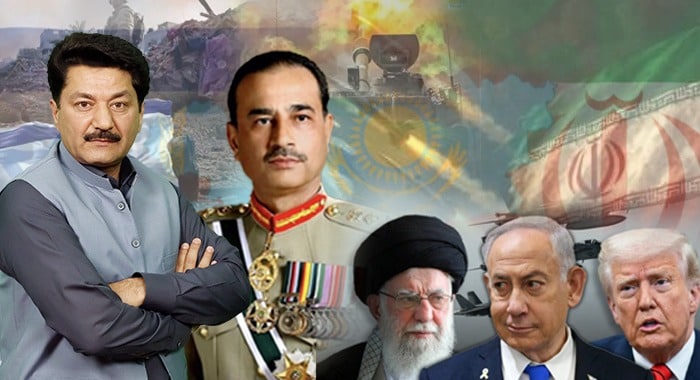In a time when the Middle East teeters on the edge of widespread chaos and world powers gamble with fire in a nuclear theatre, one man from Pakistan has emerged not with threats, but with the calm precision of a peacemaker, Field Marshal Syed Asim Munir. The Chief of Army Staff, once defined by his battlefield valour, now steps into the global spotlight as a bridge between conflict zones, a voice of restraint, and, increasingly, an ambassador of regional stability.
The recent private but extended meeting between Field Marshal Munir and former U.S. President Donald Trump made headlines, not for the optics, but for its depth. What was originally scheduled as a one-hour diplomatic courtesy turned into a two-hour deep-dive into South-Central Asia’s most pressing flash-points. Trump’s subsequent statement, that “Pakistan understands Iran better than anyone,” was not mere flattery. It was a tacit acknowledgement of Pakistan’s unique geopolitical positioning, and more importantly, of Munir’s intellectual command over the complexities of the region.
In a theatre where misinformation is as dangerous as missiles, and proxy wars are scripted by global intelligence agencies, Field Marshal Munir’s restraint is strategic. His presence is powerful not because of sabre-rattling, but because of balance, a rare trait in a time of zero-sum narratives.
Gone are the days when Pakistan could afford to be seen as merely “neutral” in conflicts involving Islamic nations. What is unfolding is not a bilateral war between Iran and Israel, but a calculated destabilisation campaign where Islamic countries are pitted against each other, and where every missile fired in the Middle East echoes in South Asia. Munir and Pakistan’s military command appear acutely aware of this.
Rather than standing idly by, Pakistan is now actively playing the role of a stabiliser, engaging global players, clarifying its regional red lines, and emphasising diplomacy over deployment. That is evident from how the nation swiftly responded to all escalatory actions, whether it was Israel’s strike on Iranian facilities, America’s subsequent involvement, or Iran’s retaliatory moves. Each time, Pakistan called for de-escalation, a stance rooted not in passivity, but in strategic foresight.
While America continues to arm Israel, and Iran builds strategic deterrence, Field Marshal Munir’s quiet yet firm diplomacy is drawing comparisons to the likes of Turkish statesmen and Cold War-era negotiators. But unlike the NATO-driven alliances or oil-protection agendas of Gulf monarchies, Munir’s approach seems to be driven by a genuine belief that peace is not weakness, it is strength harnessed.
This isn’t his first test in quiet diplomacy. Domestically, he has steered Pakistan through immense turbulence: political polarisation, economic sabotage attempts, and hybrid warfare threats funded by foreign proxies. Yet, at every juncture, he has resisted the temptation of total militarisation. His ability to act as both soldier and statesman is what now gives him legitimacy on the international stage.
For decades, Pakistan has warned the world about the perils of selective outrage, where Muslim lives in Gaza are mourned less than oil price fluctuations in Europe. Now, as missiles fly over Tel Aviv and Doha alike, the world is beginning to understand what Pakistan has known all along: instability in one corner of the Islamic world destabilises the entire Muslim bloc.
Munir’s strategic message to global leaders, including Trump, is simple but sharp: any further escalation, especially into Iran, risks igniting a sectarian firestorm from Beirut to Balochistan. And worse, it plays directly into the hands of external actors who benefit when Islamic unity fragments.
There is still much to navigate. Ceasefires brokered are broken within days. Power blocs remain interested in regime changes rather than regional stability. But within that mess, Pakistan’s role is now being seen as mature, constructive, and necessary. This is not a mere foreign policy adjustment, it is a national re-branding.
Should Donald Trump receive a Nobel Peace Prize, it would be as much a reflection of realpolitik as it is of any principled diplomacy. But if the world truly seeks to honour a stabilising force, then the quiet contribution of Field Marshal Asim Munir deserves far more international recognition, not for orchestrating a ceasefire, but for anchoring a region that the world has long ignored until it begins to burn.
History remembers those who chose to build bridges in times of war. Field Marshal Asim Munir may have worn a uniform all his life, but today, he is Pakistan’s most credible envoy for peace, not in spite of being a general, but because he is the kind of general who knows that some wars are best won without ever firing a shot.





